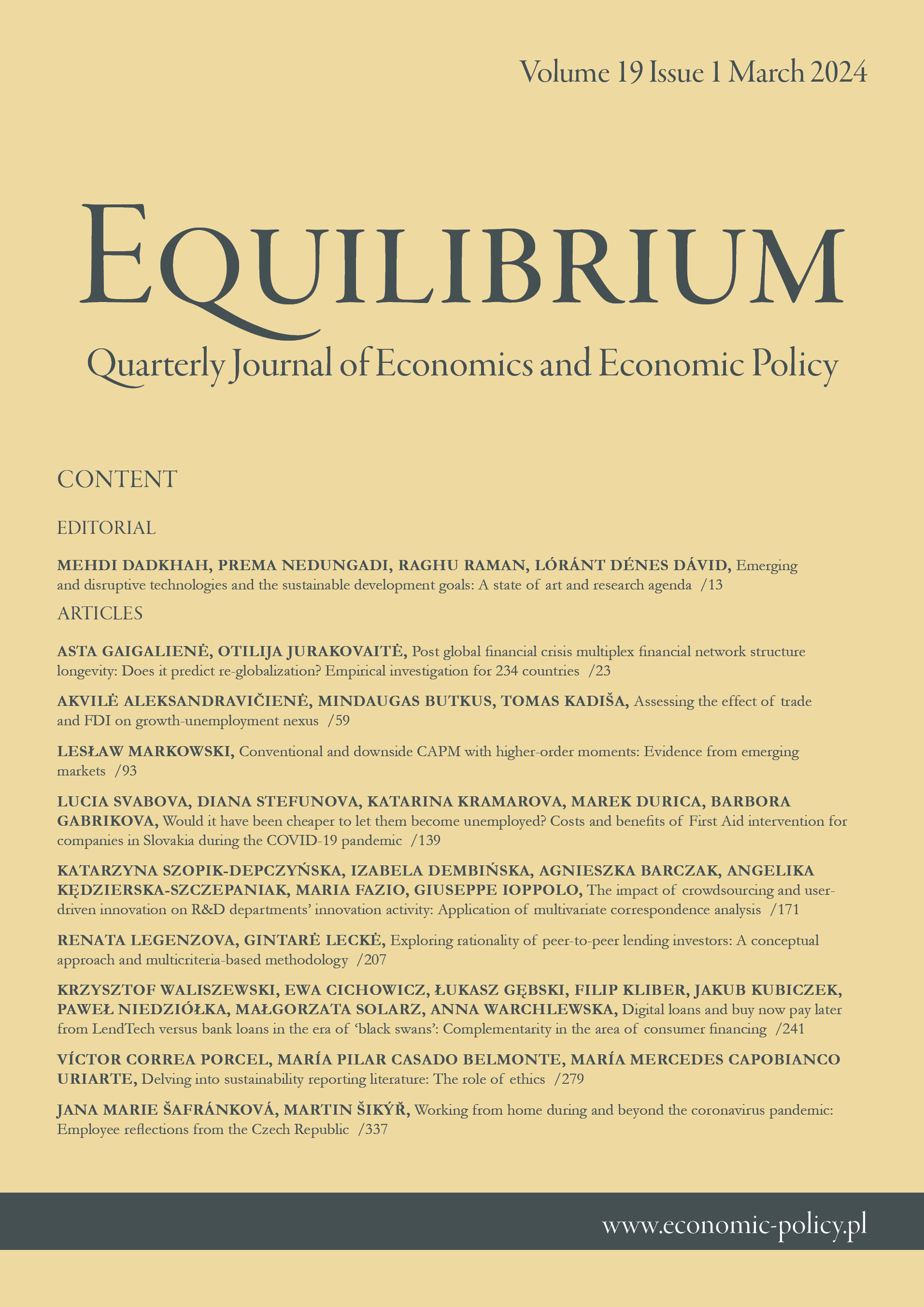Signaling hypotheses of share repurchase – life cycle approach. The case of Polish listed companies
IF 5
Q1 ECONOMICS
Equilibrium-Quarterly Journal of Economics and Economic Policy
Pub Date : 2017-06-30
DOI:10.24136/EQ.V12I2.13
引用次数: 4
Abstract
Research background: Payout policy has attracted a great deal of research, how-ever it still has not been satisfactorily explained why corporations repurchase their shares. The most popular explanation for share repurchases is their signaling power. An alternative explanation for share repurchases is related to free cash flow. We assume that both theories are not competitive, due to the fact that the motives for share repurchases may differ depending on the firm’s life cycle stage. Purpose of the article: The aim of the paper is to test the hypotheses that companies in growth stage are more prone to repurchase their shares due to the their undervaluation. Methods: Our analysis focuses on 116 repurchase on WSE and 47 repurchase on NewCon-nect in Poland during the period 2004–2016 to test the hypothesis. We assume that companies listed on WSE are in their mature stage while listed on NewConnect are in the growth stage. We use market value to book the value ratio (M/BV) and the relation of M/BV ratio for the repurchasing company to the M/BV ratio for the whole market at the date of implementing share repurchase program as a proxies for firm valuation. Findings & Value added: Our study does not confirm that repurchased companies at a growth stage are more undervalued than repurchased companies at a mature stage (at statistically significant level), however there are more repurchased companies at a growth stage with lower M/BV value than repurchase companies in mature stage. Adding corporate life cycle theory into the study, our result can contribute to the literature by more distinctly understanding the motivation of share repurchases. The results might be helpful for companies to determine their financial policies and for investors to determine their investment decisions.股票回购的信号假设——生命周期方法。波兰上市公司的案例
研究背景:股利政策已经引起了大量的研究,但是对于公司回购股票的原因仍然没有令人满意的解释。对股票回购最普遍的解释是它们的信号能力。股票回购的另一种解释与自由现金流有关。我们假设这两种理论都不具有竞争性,因为股票回购的动机可能会因公司生命周期阶段的不同而不同。文章的目的:本文的目的是检验成长期的公司由于其被低估而更倾向于回购股票的假设。方法:以2004-2016年波兰WSE的116次回购和NewCon-nect的47次回购为研究对象,对假设进行检验。我们假设在华沙交易所上市的公司处于成熟期,而在新通上市的公司处于成长期。我们用市值来账面价值比率(M/BV)以及回购公司的M/BV比率与实施股票回购计划之日整个市场的M/BV比率的关系作为公司估值的代理。发现与增值:我们的研究并未证实成长期的回购公司比成熟期的回购公司更被低估(在统计学显著水平上),但成长期的回购公司比成熟期的回购公司有更多的M/BV值更低。将公司生命周期理论纳入研究,可以更清晰地理解股票回购动机,对文献有所贡献。研究结果可能对企业制定财务政策和投资者制定投资决策有所帮助。
本文章由计算机程序翻译,如有差异,请以英文原文为准。
求助全文
约1分钟内获得全文
求助全文
来源期刊
CiteScore
9.20
自引率
3.50%
发文量
28
审稿时长
36 weeks
期刊介绍:
Equilibrium. Quarterly Journal of Economics and Economic Policy is a scientific journal dedicated to economics, which is the result of close cooperation between the Instytut Badań Gospodarczych/Institute of Economic Research (Poland) and Polish Economic Society and leading European universities. The journal constitutes a platform for exchange of views of the scientific community, as well as reflects the current status and trends of world science and economy.
The journal especially welcome empirical articles making use of quantitative methods in: Macroeconomics and Monetary Economics, International Economics, Financial Economics and Banking, Public Economics, Business Economics, Labor and Demographic Economics, Economic Development, and Technological Change, and Growth.
Current most preferable topics and special issues:
The economics of artificial intelligence: business potentials and risks;
Digitalization and entrepreneurship in economics;
Sustainable socio-economic development, environmental and ecological economics;
Transition in the energy market (improving energy efficiency, alternative energy sources, renewable energy, energy security).

 求助内容:
求助内容: 应助结果提醒方式:
应助结果提醒方式:


